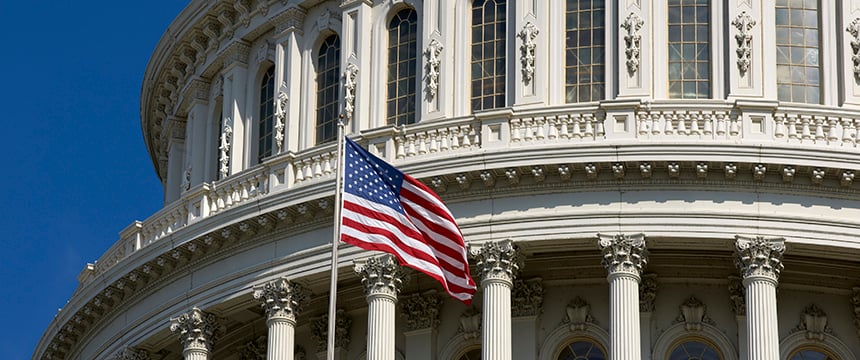
Despite February being a short month, various proposals are still on the table. As Congress returns from recess this week, it faces a daunting to-do list. Government funding runs out by mid-February, Democrats are looking for a win on competition legislation, and the Senate may soon take up a new Supreme Court nomination. Additionally, as tension between Ukraine and Russia escalates, Congress is mulling its options in response to Russian advances. Read all about these issues and more in this month’s newsletter.
1. Government funding expires on February 18th
- The current funding resolution runs out on February 18th, in which lawmakers must either pass their annual appropriations bills or another stopgap spending measure.
- The “Four Corners”, the House and Senate Appropriations Chairs and Ranking Members, have reported mixed messages about whether they will be able to pass a spending bill by Feb. 18th.
- Appropriators are reporting that they will likely need another short-term continuing resolution prior to passage. The CR is reported to last between 7 to 10 days.
- Passage of appropriations spending would mark the return of “earmark” spending to Congress for the first time in a decade. Read Foley’s insight into the earmark process here.
2. President Biden weighs nominees to fill Justice Breyer’s spot on the bench
- On Jan. 27th, Supreme Court Justice Stephen Breyer announced that he will retire at the end of the current term. The Supreme Court’s term typically ends around June/July.
- A member of the liberal wing of the court, the replacement for Breyer would not have an impact on the power balance of the court.
- At Breyer’s retirement press conference, President Biden reiterated his campaign promise to appoint an African American woman to the court. While the White House has not announced a formal pick yet, these are some of the leading contenders:
- DC Circuit Judge Ketanji Brown-Jackson
- California Supreme Court Justice Leondra Kruger
- South Carolina U.S. District Court Judge J. Michelle Childs
- Biden has promised to have the nominee pick by the end of February. Senate Majority Leader Chuck Schumer says the Senate is prepared to confirm the nominee with “all deliberate speed”.
3. Escalating tensions between Ukraine and Russia
- With the escalating crisis along the Ukrainian Border with Russia, President Biden has put 8,500 troops on standby to assist NATO forces against a possible invasion.
- Russia has seen Ukraine’s request to join NATO as a threat to their sphere of influence. Russia has requested that no more former Soviet states, including Ukraine and Georgia, be allowed to join NATO.
- NATO has stated that Russia does not have a veto on whether Ukraine can join and stated that it must respect the choices of each nation.
- House Speaker Nancy Pelosi and Majority Leader Chuck Schumer have requested an all-member White House briefing on the situation within Ukraine.
- Multiple proposals have circulated throughout Congress in response to the crisis:
- Senate Democrats recently unveiled a series of harsh financial and banking sanctions against Russia should they decide to invade Ukraine. The sanctions would also call for all “appropriate measures” to ensure the Nord Stream 2 pipeline between Russia and Germany does not become operational.
- A different proposal from a bipartisan group of senators gives President Biden the power to enter into a “lend and lease” agreement directly with Ukraine.
- Senate Foreign Relations Chair Bob Menendez (D-NJ) and Ranking Member Jim Risch (R-ID) plan to roll out formal sanctions this week.
- After the Afghanistan Withdrawal crisis last summer, Congress is anticipated to be much more vocal on the situation within Ukraine.
4. Back to square one on Biden’s Build Back Better agenda
- Democrats are back to the drawing board after Sen. Joe Manchin (D-WV) stated his opposition to the $2 trillion spending package in late December.
- Manchin has outlined that he would like to see the bill tackle climate change, drug pricing, and inflation.
- In his first news conference of 2022, President Biden stated that he would be willing to pass his Build Back Better agenda in multiple pieces.
- Provisions such as the Child Tax Credit (CTC) could be left out of the final package. Multiple Senate Democrats, including Senate Finance Chairman Ron Wyden (D-OR), have indicated they plan to fight for the CTC.
- Senate Democrats have indicated that they are formulating a package that will convalesce around expansion of health care access, prescription drug pricing, and tax incentives for clean energy.
5. House to debate China competitiveness bill in coming weeks
- The U.S. Innovation and Competition Act (USICA), introduced by Maj. Leader Chuck Schumer (D-NY) and Sen. Todd Young (R-IN), passed out of the Senate in July 2021 with 68 votes last summer. The legislation seeks to improve American competitiveness with foreign adversaries, particularly China.
- Last week, the House unveiled their modified companion bill, the “America Creating Opportunities for Manufacturing Pre-Eminence in Technology and Economic Strength Act” or “America COMPETES Act.”
- Among many other provisions, this legislation authorizes funding for semiconductor research and development, funds the supply chain for six years of critical manufacturing, and creates a special class of nonimmigrant visas for startup entrepreneurs.
- Getting this legislation through to the President’s desk is a top priority for House Democrats and the Administration in the coming weeks.
6. Dr. Robert Califf is likely to secure votes to become second-time FDA chief
- Following his nomination hearing late last year, the Senate Health, Education, Labor, and Pensions Committee advanced Califf’s nomination in a bipartisan vote of 13-8.
- With the exceptions of Sens. Bernie Sanders (I-VT) and Maggie Hassan (D-NH), committee Democrats voted in favor.
- Sens. Richard Burr (R-NC), Susan Collins (R-ME), Lisa Murkowski (R-AK), Mitt Romney (R-UT) all voted in his favor.
- For some Democratic lawmakers, there remains some skepticism of Califf’s previous record and concern that he would not go far enough in regulating opioid safety.
- Anti-abortion groups are also urging Republican lawmakers to vote against him because of recent FDA actions to remove access barriers to emergency abortion pills.
- The full floor vote has yet to be scheduled, but it will likely happen in the next few weeks.
7. Focus on bipartisan pandemic and public health preparedness legislation
- In January, the Senate HELP Committee Chair, Sen. Patty Murray (D-WA) and Ranking Member, Sen. Richard Burr (R-NC) released a discussion draft of the Prepare for and Respond to Existing Viruses, Emerging New Threats, and Pandemics Act (PREVENT Pandemics Act).
- This bipartisan legislation is the product of nearly a year of research, discussion, and hearings by the committee and will lay the foundation for a stronger public health response system for the federal government.
- It remains unclear whether or not this legislation will be considered in 2022, given the busy Senate schedule and the upcoming election cycle.
8. Support gains for banning Members of Congress from trading individual stocks
- Broad bipartisan support for banning Members of Congress from owning and trading stock has been gaining steam on Capitol Hill.
- House Speaker Nancy Pelosi has been apprehensive to the idea of banning Members of Congress from trading stock. Pelosi has recently indicated that she would be open to it should there be enough support within the Democratic caucus.
- On Tuesday, Jan. 24th, 27 Members of the House led by Rep. Jared Golden (ME-02-D), sent a letter to Speaker Pelosi and Minority Leader McCarthy urging them to take up the BAN Conflicted Trading Act or the TRUST Act. 25 Democrats and 2 Republicans signed the letter.
- The letter cites a report indicating that Congress’ current mechanisms to prevent Members of Congress from utilizing their knowledge to trade stocks have been violated hundreds of times since 2020.
9. A push to reform the Electoral Count Act of 1887
- Sen. Susan Collins (R-ME) has led a group of bipartisan senators in crafting an election reform package to update and strengthen the Electoral Count Act of 1887 (ECA).
- The Electoral Count Act of 1887 was a law passed by Congress following the contested election of 1876. The aim of which was to minimize congressional involvement in election disputes, and instead place the primary responsibility on the states.
- Updates to the ECA would be aimed at shoring up vulnerabilities that President Trump attempted to exploit following the 2020 election.
- The White House has been supportive of the efforts; however, it has stated that ECA reform is not a suitable replacement for “voting rights federal legislation”.
As the Russia-Ukraine war continues, so too do new business and legal implications for companies around the world. For more information on how to mitigate risk and protect your business, contact a Foley lawyer today.
Author(s)
Related Insights
02 April 2025
Events
How Employers Can Prepare for Immigration Audits and Visits
The landscape of U.S. immigration law is constantly shifting; don't let this uncertainty impact your business.
27 March 2025
Health Care Law Today
Massachusetts: Expansion of Oversight Authority — New Notice of Material Change Form for Health Care Transactions
The Massachusetts Health Policy Commission, an independent state agency that works to improve affordability of health care for residents of the Commonwealth, released Advance Guidance for “Providers” and “Provider Organizations” considering transactions subject to the HPC’s updated Notice of Material Change process.
26 March 2025
Foley Viewpoints
Clear Terms of Franchise Agreement Are Enforced Against Franchisee
A recent federal court decision in T&T Management, Inc. v. Choice Hotels, Inc. underscores key contractual and operational considerations for franchisors.



